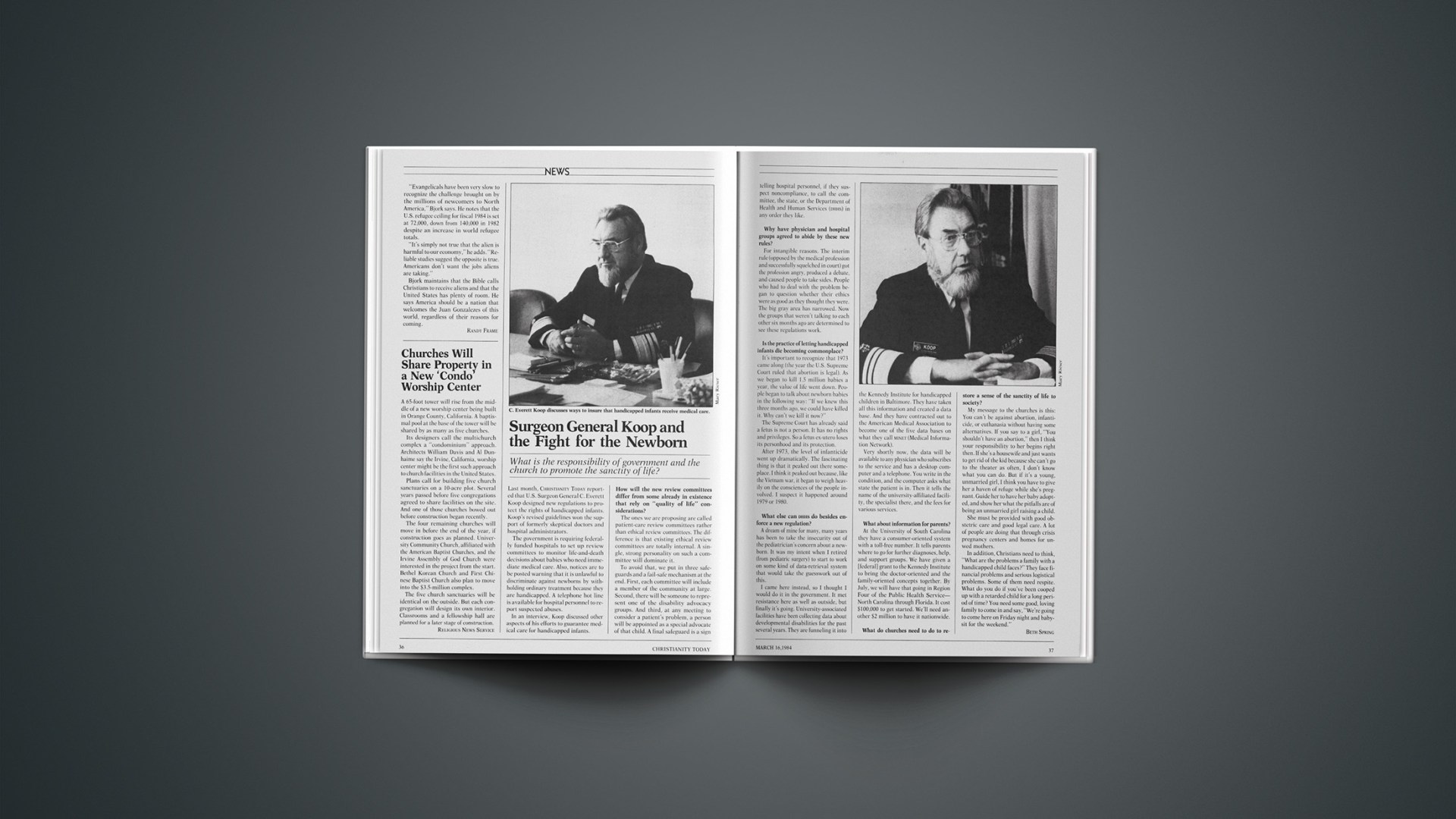What is the responsibility of government and the church to promote the sanctity of life?
Last month, CHRISTIANITY TODAY reported that U.S. Surgeon General C. Everett Koop designed new regulations to protect the rights of handicapped infants. Koop’s revised guidelines won the support of formerly skeptical doctors and hospital administrators.
The government is requiring federally funded hospitals to set up review committees to monitor life-and-death decisions about babies who need immediate medical care. Also, notices are to be posted warning that it is unlawful to discriminate against newborns by withholding ordinary treatment because they are handicapped. A telephone hot line is available for hospital personnel to report suspected abuses.
In an interview, Koop discussed other aspects of his efforts to guarantee medical care for handicapped infants.
How will the new review committees differ from some already in existence that rely on “quality of life” considerations?
The ones we are proposing are called patient-care review committees rather than ethical review committees. The difference is that existing ethical review committees are totally internal. A single, strong personality on such a committee will dominate it.
To avoid that, we put in three safeguards and a fail-safe mechanism at the end. First, each committee will include a member of the community at large. Second, there will be someone to represent one of the disability advocacy groups. And third, at any meeting to consider a patient’s problem, a person will be appointed as a special advocate of that child. A final safeguard is a sign telling hospital personnel, if they suspect noncompliance, to call the committee, the state, or the Department of Health and Human Services (DHHS) in any order they like.
Why have physician and hospital groups agreed to abide by these new rules?
For intangible reasons. The interim rule (opposed by the medical profession and successfully squelched in court) got the profession angry, produced a debate, and caused people to take sides. People who had to deal with the problem began to question whether their ethics were as good as they thought they were. The big gray area has narrowed. Now the groups that weren’t talking to each other six months ago are determined to see these regulations work.
Is the practice of letting handicapped infants die becoming commonplace?
It’s important to recognize that 1973 came along (the year the U.S. Supreme Court ruled that abortion is legal). As we began to kill 1.5 million babies a year, the value of life went down. People began to talk about newborn babies in the following way: “If we knew this three months ago, we could have killed it. Why can’t we kill it now?”
The Supreme Court has already said a fetus is not a person. It has no rights and privileges. So a fetus ex-utero loses its personhood and its protection.
After 1973, the level of infanticide went up dramatically. The fascinating thing is that it peaked out there someplace. I think it peaked out because, like the Vietnam war, it began to weigh heavily on the consciences of the people involved. I suspect it happened around 1979 or 1980.
What else can DHHS do besides enforce a new regulation?
A dream of mine for many, many years has been to take the insecurity out of the pediatrician’s concern about a newborn. It was my intent when I retired (from pediatric surgery) to start to work on some kind of data-retrieval system that would take the guesswork out of this.
I came here instead, so I thought I would do it in the government. It met resistance here as well as outside, but finally it’s going. University-associated facilities have been collecting data about developmental disabilities for the past several years. They are funneling it into the Kennedy Institute for handicapped children in Baltimore. They have taken all this information and created a data base. And they have contracted out to the American Medical Association to become one of the five data bases on what they call MINET (Medical Information Network).
Very shortly now, the data will be available to any physician who subscribes to the service and has a desktop computer and a telephone. You write in the condition, and the computer asks what state the patient is in. Then it tells the name of the university-affiliated facility, the specialist there, and the fees for various services.
What about information for parents?
At the University of South Carolina they have a consumer-oriented system with a toll-free number. It tells parents where to go for further diagnoses, help, and support groups. We have given a [federal] grant to the Kennedy Institute to bring the doctor-oriented and the family-oriented concepts together. By July, we will have that going in Region Four of the Public Health Service—North Carolina through Florida. It cost $100,000 to get started. We’ll need another $2 million to have it nationwide.
What do churches need to do to restore a sense of the sanctity of life to society?
My message to the churches is this: You can’t be against abortion, infanticide, or euthanasia without having some alternatives. If you say to a girl, “You shouldn’t have an abortion,” then I think your responsibility to her begins right then. If she’s a housewife and just wants to get rid of the kid because she can’t go to the theater as often, I don’t know what you can do. But if it’s a young, unmarried girl, I think you have to give her a haven of refuge while she’s pregnant. Guide her to have her baby adopted, and show her what the pitfalls are of being an unmarried girl raising a child.
She must be provided with good obstetric care and good legal care. A lot of people are doing that through crisis pregnancy centers and homes for unwed mothers.
In addition, Christians need to think, “What are the problems a family with a handicapped child faces?” They face financial problems and serious logistical problems. Some of them need respite. What do you do if you’ve been cooped up with a retarded child for a long period of time? You need some good, loving family to come in and say, “We’re going to come here on Friday night and babysit for the weekend.”
North American Scene
Marijuana use among teenagers has dropped to its lowest level since the government began keeping records in 1975. A study by the University of Michigan’s Institute for Social Research also shows an overall decline in the use of other illegal drugs.
A House subcommittee chose not to override a District of Columbia law that prohibits the investment of city pension funds in companies doing business with South Africa. A committee spokesman said the proposal was rejected because of the immorality of the South African practice of forced racial segregation. The District of Columbia was granted home rule 10 years ago. But Congress retains the right to veto any decision made by the 13-member city council.
A survey indicates that 18- to 24-year-old Americans are becoming more conservative where traditional values are concerned. Only 49 percent think a married woman should be able to obtain an abortion, compared to 68 percent 10 years ago. However, their attitudes haven’t changed significantly on matters of equal rights and individual choice.
The United States Catholic Conference (USCC) has endorsed an addition to the proposed Equal Rights Amendment (ERA). The suggested revision would make the ERA neutral on issues related to abortion. The USCC had not taken a position in the past because of uncertainty over the ERA’s effects on family life and the abortion issue.
A federal judge has temporarily blocked an Illinois law that requires parents to be notified before their teenage daughters can obtain abortions. The American Civil Liberties Union filed suit against the law, claiming its judicial bypass provision does not insure anonymity or a rapid appeal. The law allows minors to go to court to waive the notification requirement if they don’t want their parents to know about an abortion. The case is scheduled for a hearing late this month.
Raising the legal drinking age and imposing tougher laws against drunk drivers have helped reduce the number of alcohol-related traffic deaths. However, experts agree that this trend may diminish unless attitudes toward drinking and driving are changed. “To too many people, drinking and driving is still socially acceptable,” says John A. Volpe, chairman of the Presidential Commission on Drunk Driving.
An Alabama judge has overruled a jury and sentenced a member of the Ku Klux Klan to death in the electric chair. A jury of 11 whites and one black convicted Henry Francis Hays of killing a young black man and hanging his body from a tree. Judge Braxton Kittrell, Jr., imposed the death penalty despite the jury’s recommendation of life imprisonment.
Caesars Palace, a Las Vegas hotel and casino, has erected a Buddhist deity at its entrance. The casino installed the statue as a marketing gimmick. Gambling is prohibited for devout Buddhists.
Personalia
Reuben H. Gums has been named executive director of the Laymen’s National Bible Committee. He has served as acting director for the past year. Gums, a United Methodist minister, succeeds John F. Fisler who retired in 1982. The organization distributed more than 300,000 pieces of free literature about the Bible in 1983.
Americans United for Separation of Church and State has named Robert L. Maddox as its executive director. The pastor of Mayfield Road Baptist Church in Arlington, Texas, Maddox formerly served as a liaison to the religious community under President Carter. Americans United was formed to defend the principles of religious liberty and the separation of church and state.
Carl F. H. Henry is the latest scholar to be featured in the “Makers of the Modern Theological Mind” series published by Word Books in Waco, Texas. Bob Patterson, professor of religion at Baylor University, wrote the summary and evaluation of Henry’s thought. Henry is a former editor of CHRISTIANITY TODAY.
Stan Cottrell plans to run more than half the length of the Great Wall of China. A 40-year-old member of Atlanta’s First Baptist Church, Cottrell will be the first person to attempt the run. He intends to cover 2,800 of the wall’s 4,000 miles. The runner’s Friendship Sports Association plans to hold evangelistic rallies along the wall where the Chinese government will allow them.










